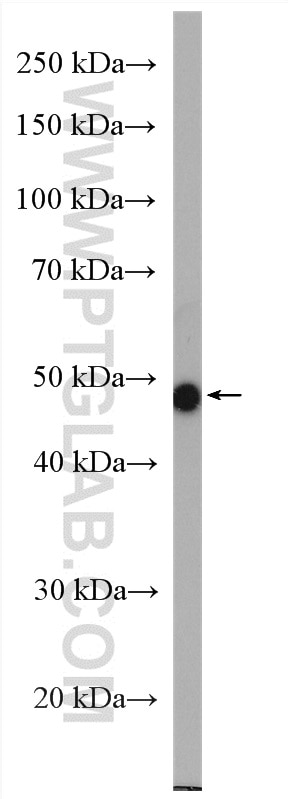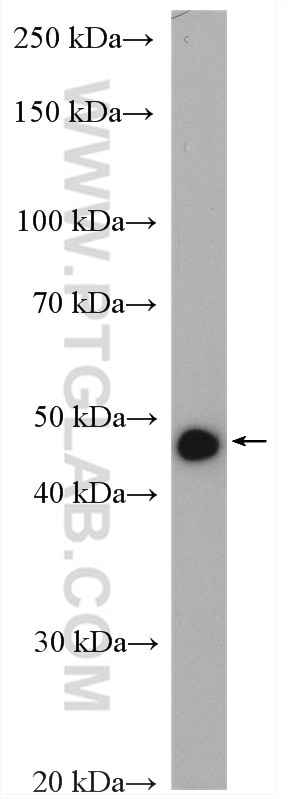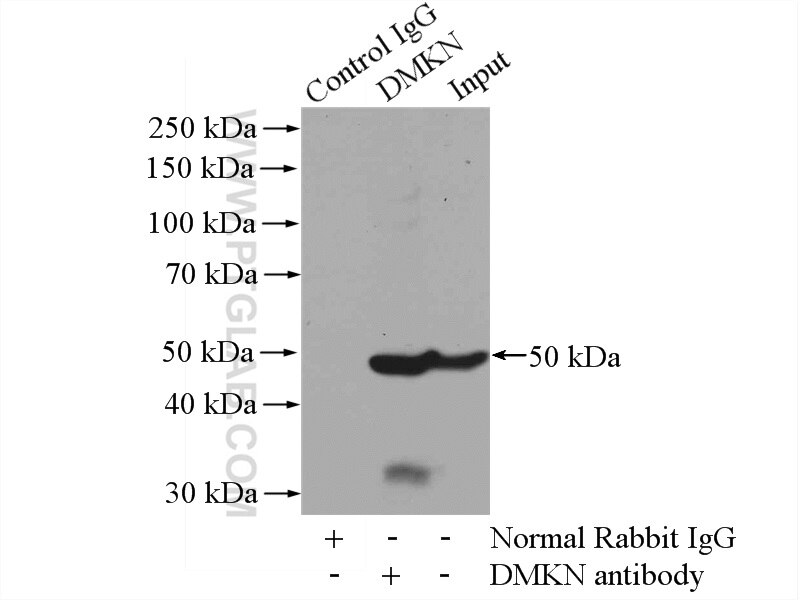DMKN Polyclonal antibody
DMKN Polyclonal Antibody for WB, IP, ELISA
Host / Isotype
Rabbit / IgG
Reactivity
human, mouse, rat
Applications
WB, IP, ELISA
Conjugate
Unconjugated
Cat no : 16252-1-AP
Synonyms
Validation Data Gallery
Tested Applications
| Positive WB detected in | mouse ovary tissue, mouse lung tissue |
| Positive IP detected in | mouse lung tissue |
Recommended dilution
| Application | Dilution |
|---|---|
| Western Blot (WB) | WB : 1:500-1:1000 |
| Immunoprecipitation (IP) | IP : 0.5-4.0 ug for 1.0-3.0 mg of total protein lysate |
| It is recommended that this reagent should be titrated in each testing system to obtain optimal results. | |
| Sample-dependent, Check data in validation data gallery. | |
Published Applications
| WB | See 1 publications below |
Product Information
16252-1-AP targets DMKN in WB, IP, ELISA applications and shows reactivity with human, mouse, rat samples.
| Tested Reactivity | human, mouse, rat |
| Cited Reactivity | mouse |
| Host / Isotype | Rabbit / IgG |
| Class | Polyclonal |
| Type | Antibody |
| Immunogen | DMKN fusion protein Ag9242 |
| Full Name | dermokine |
| Calculated Molecular Weight | 476 aa, 47 kDa |
| Observed Molecular Weight | 48-55 kDa |
| GenBank Accession Number | BC011886 |
| Gene Symbol | DMKN |
| Gene ID (NCBI) | 93099 |
| RRID | AB_10596473 |
| Conjugate | Unconjugated |
| Form | Liquid |
| Purification Method | Antigen affinity purification |
| Storage Buffer | PBS with 0.02% sodium azide and 50% glycerol pH 7.3. |
| Storage Conditions | Store at -20°C. Stable for one year after shipment. Aliquoting is unnecessary for -20oC storage. 20ul sizes contain 0.1% BSA. |
Background Information
DMKN, also named as epidermis-specific secreted protein SK30/SK89, acts as a soluble regulator of keratinocyte differentiation. DMKN has 16 isoforms with MW 9-20 kDa, 35-38 kDa and 42-48 kDa.
Protocols
| Product Specific Protocols | |
|---|---|
| WB protocol for DMKN antibody 16252-1-AP | Download protocol |
| IP protocol for DMKN antibody 16252-1-AP | Download protocol |
| Standard Protocols | |
|---|---|
| Click here to view our Standard Protocols |
Publications
| Species | Application | Title |
|---|---|---|
Mol Cell Proteomics Deletion of cysteine cathepsins B or L yields differential impacts on murine skin proteome and degradome. | ||
Mol Cell Proteomics Matrix metalloproteinase 10 degradomics in keratinocytes and epidermal tissue identifies bioactive substrates with pleiotropic functions. |




